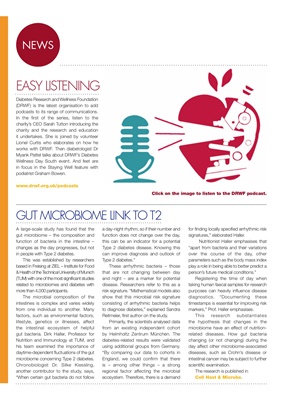
NEWS
EASY LISTENING
Diabetes Research and Wellness Foundation
(DRWF) is the latest organisation to add
podcasts to its range of communications.
In the first of the series, listen to the
charity's CEO Sarah Tutton introducing the
charity and the research and education
it undertakes. She is joined by volunteer
Lionel Curtis who elaborates on how he
works with DRWF. Then diabetologist Dr
Myank Pattel talks about DRWF's Diabetes
Wellness Day South event. And feet are
in focus in the Staying Well feature with
podiatrist Graham Bowen.
www.drwf.org.uk/podcasts
A large-scale study has found that the
gut microbiome - the composition and
function of bacteria in the intestine -
changes as the day progresses, but not
in people with Type 2 diabetes.
This was established by researchers
based in Freising at ZIEL - Institute for Food
& Health of the Technical University of Munich
(TUM) with one of the most significant studies
related to microbiomes and diabetes with
more than 4,000 participants.
The microbial composition of the
intestines is complex and varies widely
from one individual to another. Many
factors, such as environmental factors,
lifestyle, genetics or illnesses, affect
the intestinal ecosystem of helpful
gut bacteria. Dirk Haller, Professor for
Nutrition and Immunology at TUM, and
his team examined the importance of
daytime-dependent fluctuations of the gut
microbiome concerning Type 2 diabetes.
Chronobiologist Dr. Silke Kiessling,
another contributor to the study, says,
"When certain gut bacteria do not follow
GUT MICROBIOME LINK TO T2
Click on the image to listen to the DRWF podcast.
a day-night rhythm, so if their number and
function does not change over the day,
this can be an indicator for a potential
Type 2 diabetes disease. Knowing this
can improve diagnosis and outlook of
Type 2 diabetes."
These arrhythmic bacteria - those
that are not changing between day
and night - are a marker for potential
disease. Researchers refer to this as a
risk signature. "Mathematical models also
show that this microbial risk signature
consisting of arrhythmic bacteria helps
to diagnose diabetes," explained Sandra
Reitmeier, first author on the study.
Primarily, the scientists analysed data
from an existing independent cohort
by Helmholtz Zentrum München. The
diabetes-related results were validated
using additional groups from Germany.
"By comparing our data to cohorts in
England, we could confirm that there
is - among other things - a strong
regional factor affecting the microbial
ecosystem. Therefore, there is a demand
for finding locally specified arrhythmic risk
signatures," elaborated Haller.
Nutritionist Haller emphasises that
"apart from bacteria and their variations
over the course of the day, other
parameters such as the body mass index
play a role in being able to better predict a
person's future medical conditions."
Registering the time of day when
taking human faecal samples for research
purposes can heavily influence disease
diagnostics. "Documenting these
timestamps is essential for improving risk
markers," Prof. Haller emphasises.
This research substantiates
the hypothesis that changes in the
microbiome have an effect of nutritionrelated
diseases. How gut bacteria
changing (or not changing) during the
day affect other microbiome-associated
diseases, such as Crohn's disease or
intestinal cancer may be subject to further
scientific examination.
The research is published in
Cell Host & Microbe.